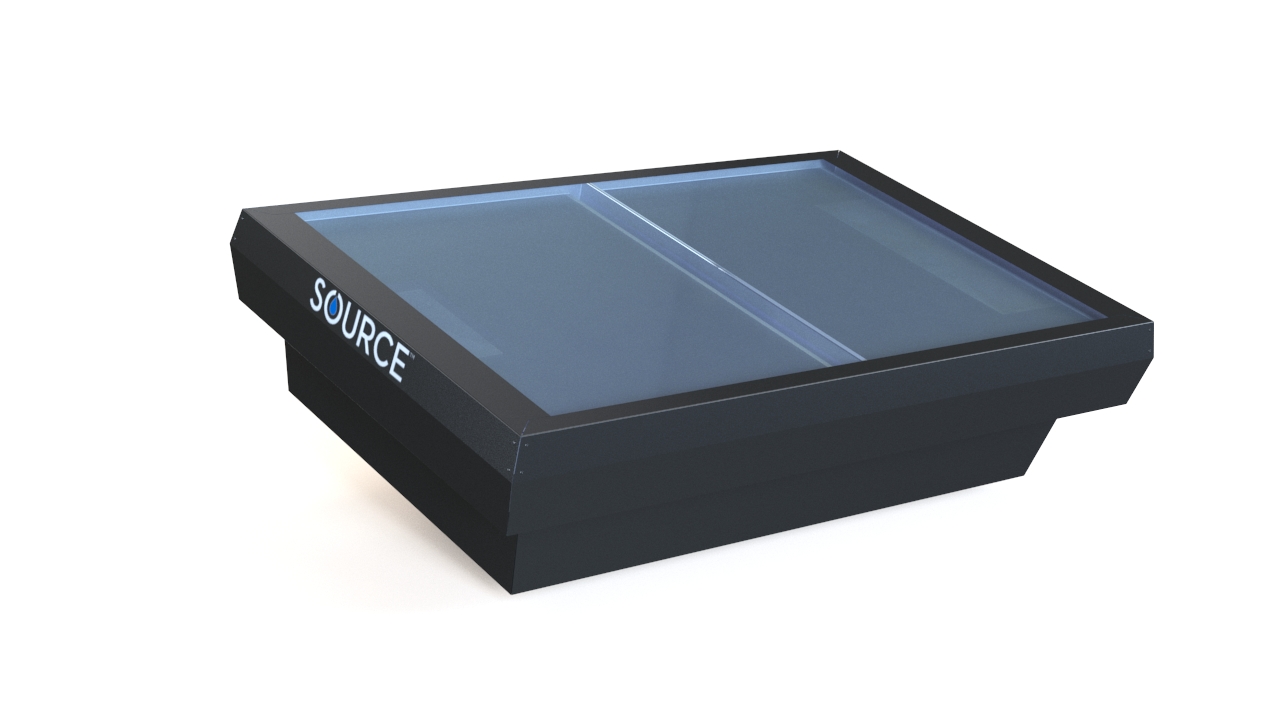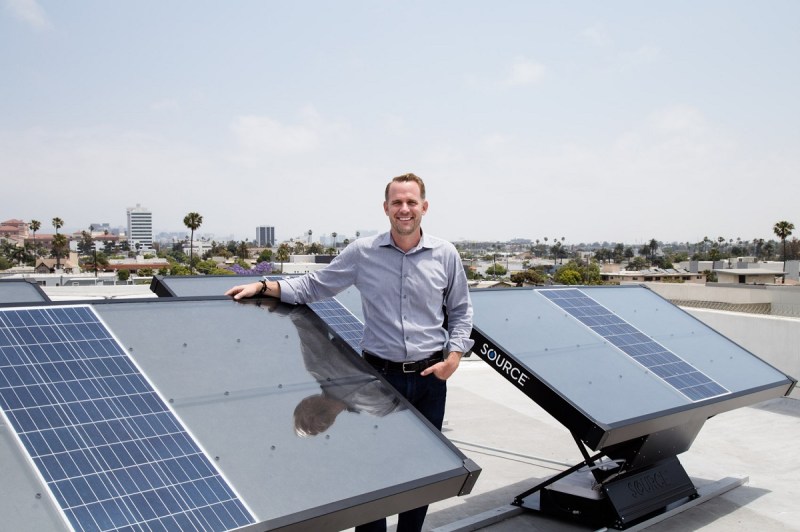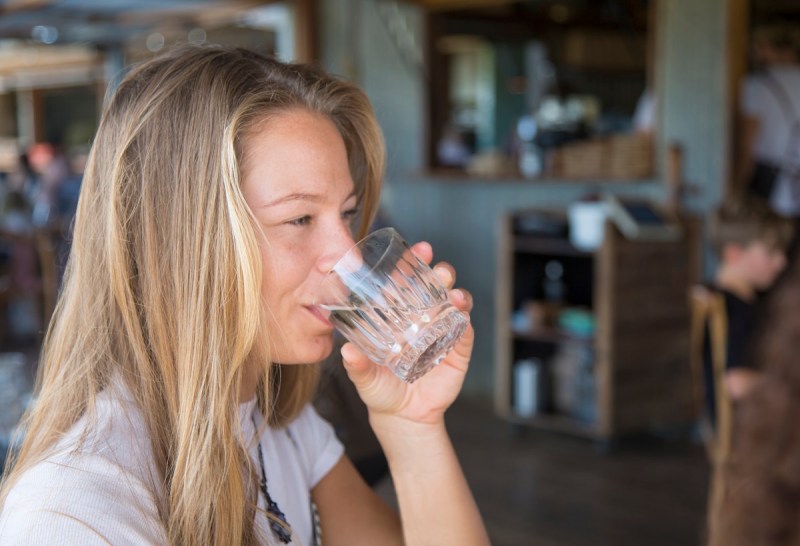Zero Mass Water showed us last year that its Source Hydropanel could pull water out of thin air. And now it’s reducing the size of those panels — kindling hope that one day we’ll have an artisanal water source on every rooftop.
The Scottsdale, Arizona-based startup is returning to CES, the big tech trade show in Las Vegas this week, with a new Source Rexi Hydropanel that is half the size of the previous version, is easier to install, and can produce more water on a daily basis. The company is also introducing its new “water-as-a-service” business model.
The Source Hydropanel is the brainchild of Cody Friesen, CEO of Zero Mass Water and associate professor of materials science at Arizona State University.
Zero Mass Water is one of those companies that hopes to change the world. Like something out of Frank Herbert’s classic science fiction novel Dune, it has created the Source Hydropanel, which can extract water from air and electricity. It does so by using air and solar panels to create the right conditions to speed up the process of condensing water from even arid air.
June 5th: The AI Audit in NYC
Join us next week in NYC to engage with top executive leaders, delving into strategies for auditing AI models to ensure fairness, optimal performance, and ethical compliance across diverse organizations. Secure your attendance for this exclusive invite-only event.
This seems like magic, as it requires no electrical input, pipes, or public utility infrastructure. And it’s why I considered Zero Mass Water’s Source Hydropanels to be one of the best products of CES 2019 last year. The beauty of the product is that it uses the resources that are already in abundance around us — the water that exists in our air. That’s important, as 2 million people in the U.S. don’t have access to running water, and toxic perfluorinated alkyl substances (PFAS) have been found in water supplies across 49 states.
The new model Source Hydropanel

Above: Source Rexi Hydropanel is smaller than Zero Mass Water’s previous version.
The new residential model, called Rexi, is half the size of a standard Hydropanel with a reduced form factor optimized for rooftop water production on homes, as well as schools and businesses. Preorders begin today, and installations are scheduled to begin in summer 2020.
The new Source Rexi Hydropanel incorporates advancements from the original Source Hydropanel released in 2017, including higher efficiency rates, due to developments in materials science, software, and thermodynamics, as well as internal research.
Rexi uses a cloud-based sensor suite to bring detailed water-quality knowledge and automated optimization features to residential Hydropanels installed all over the world. Homeowners can track the performance of their Hydropanels, the quality of their water, and the available amount of water stored in each Hydropanel’s reservoir through the Source smartphone app.
Zero Mass Water’s focus is on providing off-grid, independent access to perfect drinking water for every person in every place, empowering people to create their own drinking water in a sustainable and low-cost way.
How it works

Above: Cody Friesen is CEO of Zero Mass Water.
Source Hydropanels function by first adsorbing water vapor from the air onto a hygroscopic material. The efficient application of solar energy causes the water vapor to respire from the materials inside the Hydropanel, raising the relative humidity to a passively condensing vapor. As the hygroscopic materials only attract water molecules, the liquid water produced is pure, not unlike distilled. The innovations behind Source earned the company the 2019 Lemelson-MIT Prize, awarded for invention by the prestigious technical institution.
The new Source Rexi Hydropanels will retail for $2,500. They will be on display at CES 2020 at booth CP-5, located in the Central Plaza.
Water-as-a-service model

Above: Zero Mass Water can deploy masses of Source Fields with its Hydropanels.
Zero Mass Water has introduced a way to supply larger amounts of water through a new business model. The company said it has deployed multiple Source Fields, or large-scale Hydropanel arrays that create an ongoing supply of water for communities and businesses.
Able to operate independently of an electrical grid, Source Fields can be deployed virtually anywhere in the world and are capable of producing millions of gallons of renewable drinking water at a single site annually.
To date, Zero Mass Water has four Source Fields to service nearby communities and businesses, with several others in development and construction.
Source Field locations include:
Phoenix, Arizona: An array creating up to 182,500 liters of water annually, servicing local businesses, such as restaurants and grocery stores, introducing sustainably sourced renewable drinking water as an alternative to tap and plastic bottled water in a metropolitan area known for droughts and water stress.
Queensland, Australia: An array creating up to 1 million liters of water annually, selling water under contract to Waddi Springs, a premium water bottling company that is selling a localized, non-extractive, and responsibly packaged solution. Southeast Queensland is one of the highest density markets for bottled water consumption in Australia, and primarily reliant on PET packaged bottled and premium water imported from international markets. With a local Source Field, Waddi Springs can offer a renewable alternative that doesn’t waste Australia’s natural resources while providing a localized, plastic-free alternative in the market.
Dubai, United Arab Emirates (Platinum Heritage): An array creating up to 182,500 liters of water annually was designed for the Platinum Heritage group, which is known for its sustainable desert safaris highlighting the local Emirati culture and heritage. With access to an onsite Source Field, the hospitality group is able to sustainably create drinking water for its guests in the arid Arabian desert, no longer relying on long-distance water deliveries from desalination plants.
Dubai, United Arab Emirates (Blue Eyes): This array creates up to 1 million liters of water annually for Blue Eyes, an emerging packaged water brand that is differentiating itself by launching the only renewable water product available in the local market. All of Dubai’s drinking water is otherwise created through desalination, which is expensive, energy-intensive, and detrimental to marine life. Access to a Source Field enables a more sustainable future across the Emirates.

Above: Can Zero Mass Water make a perfect cup of water?
Zero Mass Water said the Source Fields bring to life the company’s mission to make drinking water an unlimited resource. This water solution uses two different models: a Water Purchase Agreement, through which a customer contracts for a certain amount of water per month and pays in real time for the water produced, or direct purchase of a Source Field and ownership of the water produced in its entirety.
The options in payment models provide Zero Mass Water customers with greater flexibility and increase the accessibility of Source Fields to global stakeholders through “switch and save” opportunities. These can dramatically reduce the consumption of PET bottles and connect communities to clean drinking water that is more effective and affordable than centralized infrastructure models, the company said.
Arthur Ortiz, general manager at Platinum Heritage, Dubai, said in a statement that he wasn’t initially convinced Hydropanels could generate premium drinking water in the middle of a hot environment like the Platinum Heritage Desert Camp. But he knows now that it really works.
Zero Mass Water has 100 employees and has raised $65 million in two rounds since 2017. Investors include 3×5, Material Impact, and Breakthrough Energy Ventures.


